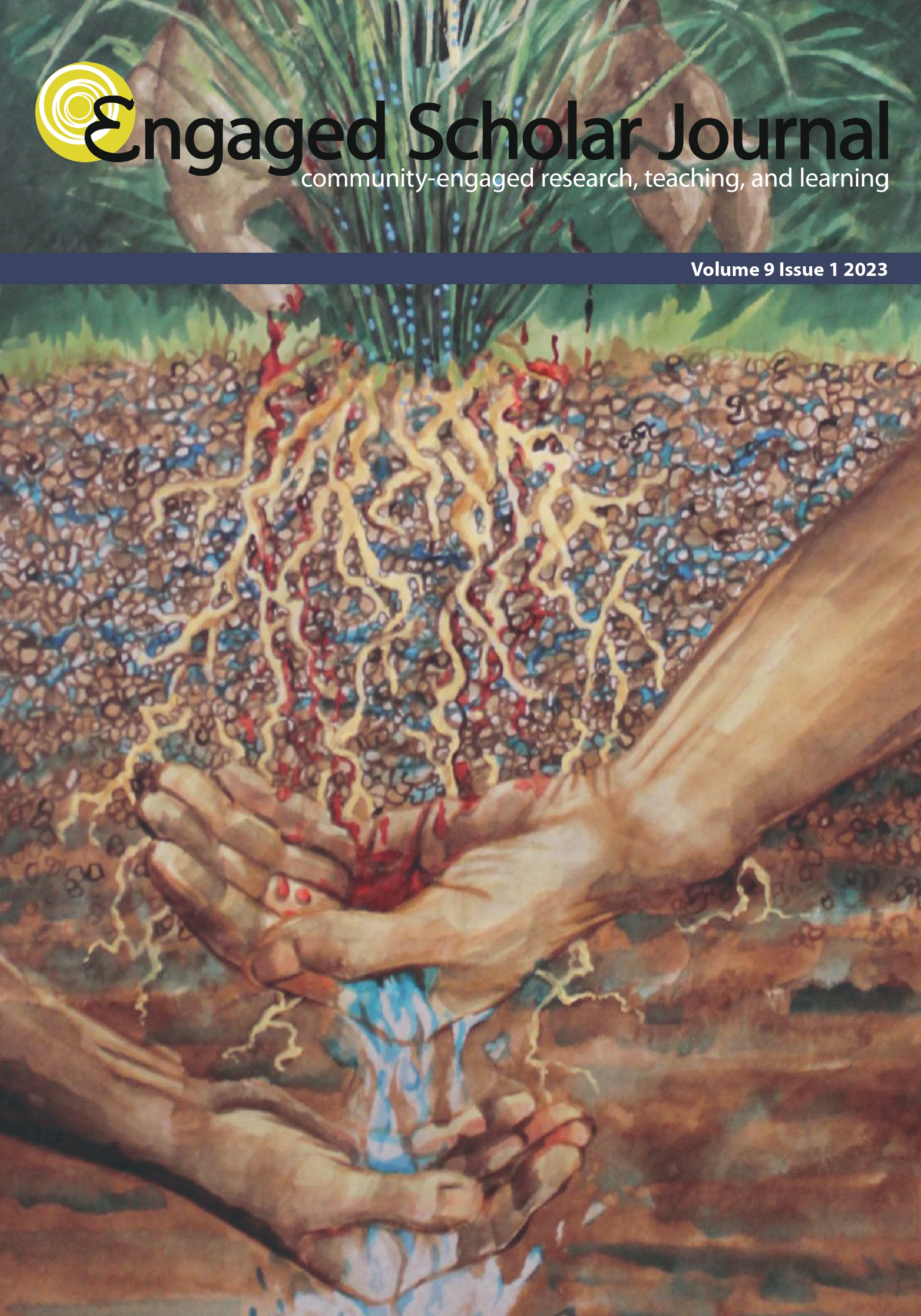Centering Reciprocity and Accountability in Community-Based Research: How Meaningful Relationships with a Community Advisory Group Impacted Survey Development
DOI:
https://doi.org/10.15402/esj.v9i1.70800Keywords:
community advisory group, reciprocity, accountability, survey development, community-based research, gender-based violence, community advisory boardAbstract
Community advisory boards (CAB) or groups (CAG) are frequently included in qualitative community-based research (CBR), particularly in the early phases of assessing need, impact, and design of a research project. Projects with emancipatory, liberatory, or decolonial emphases include CAGs in the spirit of inclusivity, representation, transformation, truth-telling, and participation, but the methodological value and impact of such groups often remains under-explored in reports about the research. It is also relatively uncommon to use CAGs in quantitative research. In our survey research about post-secondary instructors’ experiences of receiving student disclosures of gender-based violence, we used a time-limited, task-specific CAG to assist with survey development. In this report from the field, we discuss our approach to the inclusion of a CAG in our research, which emphasized reciprocity and accountability to community, and we explore how the use of a CAG directly impacted and strengthened the quantitative study.
References
Abelsohn, K., Benoit, A.C., Conway, T., Cioppa, L., Smith, S., Kwaramba, G., Lewis, J., Nicholson, V., O’Brien, N., Carter, A., Shurgold, J., Kaida, A., de Pokomandy, A., Loutfy, M., & the CHIWOS Research Team. (2015). ‘Hear(ing) new voices’: Peer reflections from communitybased survey development with women living with HIV. Progress in Community Health Partnerships: Research, Education and Action, 9(4), 561-569. https://doi.org/10.1353/cpr.2015.0079
Arnold, T. J., Malki, A., Leyva, J., Ibarra, J., Daniel, S. S., Ballard, P. J., Sandberg, J. C., Quandt, S. A., & Arcury, T. A. (2019). Engaging youth advocates in community-based participatory research on child farmworker health in North Carolina. Progress in Community Health Partnerships: Research, Education, and Action, 13(2), 191–199. https://doi.org/10.1353/cpr.2019.0019
Cargo, M., & Mercer, S. L. (2008). The value and challenges of participatory research: Strengthening its practice. Annual Review of Public Health, 29, 325–350. https://doi.org/10.1146/annurev.publhealth.29.091307.083824
D’Alonzo, K. T. (2010). Getting started in CBPR - Lessons in building community partnerships for new researchers. Nursing Inquiry, 17(4), 282-288. https://doi.org/10.1111/j.1440-1800.2010.00510.x
Flicker, S., Guta, A., Larkin, J., Flynn, S., Fridkin, A., Travers, R., Pole, J. D., & Layne, C. (2010). Survey design from the ground up: Collaboratively creating the Toronto Teen Survey. Health Promotion Practice, 11(1), 112-122. https://doi.org/10.1177/1524839907309868
Godderis, R. & Root, J. (2017). Addressing sexual violence on post-secondary campuses is a collective responsibility. Transformative Dialogues, 9(3), 1-9.
Hanson, C. & Ogunade, A. (2016). Caught up in power: Exploring discursive frictions in community research. Gateways: International Journal of Community Research and Engagement, 9(1), 41-57. https://doi.org/0.5130/ijcre.v9i1.4729
Khan, S. R., Hirsch, J. R., Wamboldt, A., & Mellins, C. A. (2018). “I didn’t want to be ‘That Girl’”: The social risks of labeling, telling, and reporting sexual assault. Sociological Science, 5, 432-460. https://doi.org/10.15195/v5.a19
Koné, A., Sullivan, M., Senturia, K. D., Chrisman, N. J., Ciske, S. J., & Krieger, J. W. (2000). Improving collaboration between researchers and communities. Public Health Reports, 115(2–3), 243–248. https://doi.org/10.1093/phr/115.2.243
Maiter, S., Simich, L., Jacobson, N., & Wise, J. (2008). An ethic for community based participatory action research. Action Research, 6(3): 305-325. https://doi.org/10.1177/1476750307083720
Newman, S.D., Andrews, J.O., Magwood, G.S., Jenkins, C., Cox, M.J., & Williamson, D.C. (2011). Community advisory boards in community-based participatory research: A synthesis of best processes. Preventing Chronic Disease: Public Health Research, Practice and Policy, 8(3), A70.
Root, J. & Godderis, R. (2016). Instructor responses to student disclosures of gender-based violence on campus. Canadian Journal of Action Research, 17(3), 3-19.
Sharoni, S., & Klocke, B. (2019). Faculty confronting gender-based violence on campus: Opportunities and challenges. Violence against women, 25(11), 1352-1369. https://doi.org/10.1177/1077801219844597
Swartz, S. (2011). ‘Going deep’ and ‘giving back’: Strategies for exceeding ethical expectations when researching amongst vulnerable youth. Qualitative Research, 11(1), 47-68. https://doi.org/10.1177/1468794110385885
Vaughn, L. M., & Jacquez, F. (2020). Participatory research methods – Choice points in the research process. Journal of Participatory Research Methods, 1(1). https://doi.org/10.35844/001c.13244
Williams, R. L., Shelley, B. M., Sussman, A. L., & RIOS Net Clinicians (2009). The marriage of community-based participatory research and practice-based research networks: Can it work? A Research Involving Outpatient Settings Network (RIOS Net) study. Journal of the American Board of Family Medicine: JABFM, 22(4), 428–435.
https://doi.org/10.3122/jabfm.2009.04.090060
Wolferman, N., Hunter, T., Hirsch, J. S., Khan, S. R., Reardon, L., & Mellins, C. A. (2019). The advisory board perspective from a campus community-based participatory research project on sexual violence. Prog Community Health Partnership, 13(1):115–119. https://doi.org/10.1353/cpr.2019.0014
World Health Organization. (2020). Working with Community Advisory Boards for COVID-19 related clinical studies. https://www.who.int/publications/m/item/working-with-communityadvisory-boards-for-covid-19-related-clinical-studies
Yang, K.I., Chung-Do, J. J., Fujitani, L., Foster, A., Mark, S. Okada, Y., Saad-Jube, Z., Youkhana, F., Braun, K.L., Cassel, K., Helm, S., Ka‘opua, L., Mataira, P.J., Nishita, C., Okamoto, S.K., Sy, A.U., Townsend Ing, C., Qureshi, K., Umemoto, K. (2019). Advancing community-based participatory research to address health disparities in Hawai‘i: Perspectives from academic researchers. Hawai‘i Journal of Medicine and Public Health, 78(3): 83-88.
Published
How to Cite
Issue
Section
License
Authors who publish with this journal agree to the following terms:
- Authors retain copyright and grant the journal right of first publication with the work simultaneously licensed under a Creative Commons Attribution License CC BY 4.0 that allows others to share the work with an acknowledgement of the work's authorship and initial publication in this journal.
- Authors are able to enter separate, additional contractual agreements for the non-exclusive distribution of the journal's published version of the work (e.g., post it to an institutional repository or publish it in a book), with an acknowledgement of its initial publication in this journal.
- Authors are permitted to post their work online (e.g., in an institutional repository or on their website) after the publication of their work in the Engaged Scholar Journal.
- Please note that while every opportunity will be taken to ensure author participation in the editing process, due to time constraints final copyediting changes may be made before publication to ensure APA adherence throughout all submissions.




